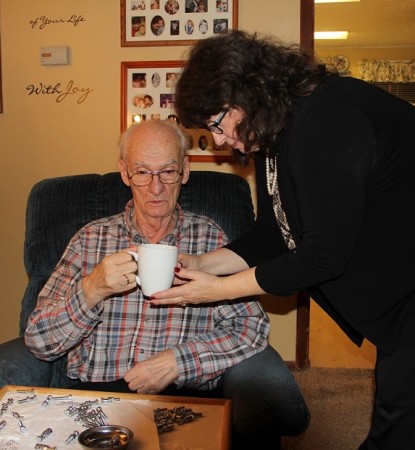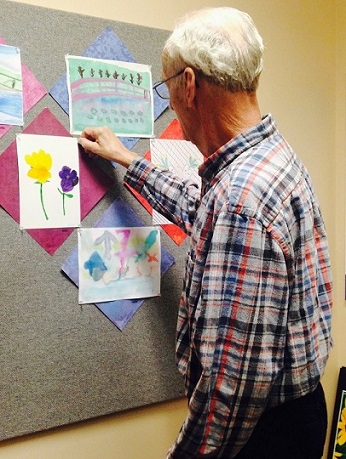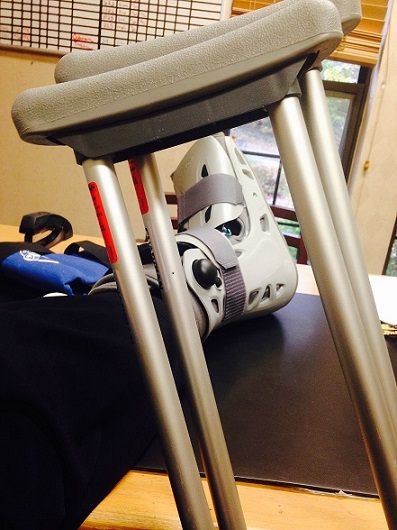A day in the life of a caregiver who works full-time
 Last month, Minnesota-based caregiver, Sheri Zschocher was featured in a U.S. News & World Report article about caregivers blogging for balance.
Last month, Minnesota-based caregiver, Sheri Zschocher was featured in a U.S. News & World Report article about caregivers blogging for balance.
A caregiver since 2008 after her husband was diagnosed with younger onset Alzheimer’s, she remains busy juggling full-time employment and caregiving.
Having cared for my father at home, I know first-hand the day-to-day toll of combining caregiving and full-time work. I tried to justify a request of a busy caregiver with a note about how frazzled my day had been after following Plan B. Hoping for empathy from someone who shows boundless compassion, I wrote, “Tomorrow will be a LONG day—6am start to a full workday then a 2-hour drive at 5 down to Culver City (south of Los Angeles) for a meeting. Home by 11pm.”
Within the hour I received the following draft (published as written by a frazzled caregiver).
One Caregiver’s Daily Schedule
 You are so very busy, me too. Here was my day.
You are so very busy, me too. Here was my day.
4:30 am wake up drink coffee write blog with cat/cats on lap
5:30 am begin to think about what to wear to work
5:45 am wake up Bob (and “Al”), put his robe on him, get him into bathroom, get him to his living room chair, get his coffee, turn on his massage pillow for his back.
6:00 I start getting me ready for work while Bob’s meds kick in
6:18 get bob to bedroom to help him dress then take him to bathroom to help him shave and brush teeth while running back and forth to bedroom finishing self
Out the door at 7:00am tell bob which car door to get in
7:15 am drop bob at day care
7:30am I arrive at work
7:30am- 4:30 pm manage a community of 196 apartments and balance maximum occupancy with daily crises.
5:00pm pick up bob at day care tell him which door to get in
5:30 make dinner
6:00pm give Bob night meds
7:00pm get Bob changed for bed
7:30 pm Bob in bed
Get up and do it all over again LOL
Oh the things we do!
My jaw dropped. Her schedule clearly illustrates the day-to-day grind of caregiving and work. My schedule is stressful enough producing an abundance of cortisol, but when someone depends on you 24/7, you have to step up.
I called her to request permission to publish her draft schedule. By reading one’s experience, you may be inspired and help others. She agreed.
Sheri Zschocher works full time to provide for her and her husband and the rest of the time she cares for him. She’s been doing this for 7 years.
Adult Day Services are a Big Help
Her community offers conveniently located and scheduled adult day services. She takes advantage of their services during the weekdays in order to work full time. She’s secure in knowing her husband is well-cared for and engaged in purposeful activities at the Augustana Open Circle Adult Day Center. [TCV Update 7/16/2024: Updated with Open Circle ADC URL]
As I thought more about her schedule, I wondered if she were paid the same salary to stay at home to care for Bob (and “Al”), would she? (Sheri refers to her husband Bob as “Al” for Alzheimer’s.) She writes:
If my income were the same, I could give better personal care and find better ways of engaging Bob in things. But the flip side is that at the adult day center, he fits in and is involved in his way. I am not sure I could provide him the same stimulation. For instance, the choir he is in is very important to him. The choir visits other senior buildings to sing. He is very proud of his participation.
I can’t really say that I would or wouldn’t. The constant burden of a caregiver’s heart, is trying to know what type of care is best, for all three of us.
I was curious if she had changed her mind a couple days later.
The other issue for me is that I crave conversation, discussion with depth that I have come to rely on my co-workers for. Caregiving for Robert full time might heighten my feelings of isolation creating a less patient me. When you look at a 24-hour day and he’s at “work” for 9.5 hours that still leaves 14.5 hours he’s with me. He needs my help and attention as he gets up 4 or 5 times during the night. I think this still qualifies as full time.
Footnote… literally!
 The story doesn’t end here. The day before Sheri Zschocher’s feature in U.S. News & World Report, she lost her balance on a makeshift step and broke her foot.
The story doesn’t end here. The day before Sheri Zschocher’s feature in U.S. News & World Report, she lost her balance on a makeshift step and broke her foot.
The stress of caregiving is real. And it’s important to take a respite. We never know what life will hand us. And if all this wasn’t enough, her mom died, suddenly. She had to fly to Texas with broken foot.
If her story inspires you to take better care of yourself starting with more caregiver respites, sharing her experiences will have been worthwhile. LIFE happens and we have to scramble with Plan B. Fortunately, one of Sheri’s daughters is nearby and able to help Mom and Dad while juggling her own full-time work.









Oh and thank you, Brenda for turning me on to the blog of Sherri Z! I haven’t been there yet but am eager to. I hadn’t found a cyber-resource regarding caregiving for a spouce who is relatively young. I feel pretty lonely and misunderstood sometimes because so very much information and a vast majority of resources are for caregivers of parents or grandparents or “seniors caring for “senior” spouce. I sure sympathize with them, and even empathize to an extent, of course, as with Donald, I learn from them and am inspired by them too! It’s just also nice to be in touch with someone a bit closer to my situation. Score!
Yes, that’s the hard part, Jenny. Finding support groups for caregivers for younger people.
Because the incidents are not as frequent as care for elders, they are hard to find.
Start by searching online. As you mention, it’s better to be among people who walk your same caregiving path.
I see you made it to the blog jenny 🙂 Please know that we care about what you are going through. Hugs to you and yours.
Donald, thanks for more blessings, though I’m not one who works along with caregiving. I feel your truth as a blessing and I understand the dilemma you noted. My husband is just about to turn 65. He’s had AD for over 15 years, so now is more severe than moderate. He will no longer stay at adult day programs. One is too boring, the other too over stimulating. Since a head injury in March this year he also struggles with aggression. WE do. Now we are almost exclusively at home because our most new, cutting edge “Memory Care” residence evicted him after 6 weeks. He does not take well to any environment if he is not one-on-one with someone he trusts me or 2 paid male caregivers A specialist in young-onset Alz is “aggressively increasing” Seroquel and its helping, still my resources are very very limited. I’m right there with ya, brother, as you share the greif that comes with a lack of trustworthy or fitting respite. God, will you please give Donald everything he needs to heal fully… and more?!! Thank you. and thank you ,Donald, for laying out for us your heart, reality, humility, and inspiration.
I am my husband’s, of 48 years, caregiver as he has Parkinsons and Alzheimers. Presently he is on hospice care in our home. I was also a caregiver for my Mom who lived with us for 25 years until she passed last October. Sherri’s daily blog is a life saver for me. “Storms make trees take deeper roots….” Take care…..
Thank you for the feedback Sandra. You are a strong woman, hugs to you and yours.
My name is Maureen Connolly and I am caregiver to my husband Jerry who was diagnosed with early onset Alzheimers in 2009. Everyday I am inspired through Sheri’s blog. Being able to separate my husband “Jerry” from”Al” has always helped me to maintain my constant patience and composure. Sheri is a gift to all of us. She brings a smile to my face or simply a feeling of not being alone in this, on a day to day basis. I have never met her, but I love her!
Maureen
Maureen,
Thank you so much for you support and kind comments both here and directly on the blog. I can not explain how much it helps me to to get the feedback, it let s me know I have purpose and that I am not alone either.
I try to care for my parents, father 89 with well past mid stage vascular dementia, and my 91 year old mother, essentially blind and with osteo arthritis. They want to live in their own home, and my brother and I are trying to make that work … with some paid caregiver help and us.
I have absolutely huge respect for spouses who are caregivers for their wife or husband. It’s difficult enough to watch a parent disappear before your eyes, I can’t imagine how difficult it would be to witness your own spouse.
When I begin to feel sorry for myself, and find life difficult, I always remember the spouses, like Sheri, who deal with so much more than I. That helps.
Kudos to every caregiver of someone with a dementia … we love them dearly and sacrifice everything to help them. I hope there could be more support for us all.
Jennifer, Thank you so much for the comments and support, this disease is devastating for all that it affects. Hugs to you and yours.
Brenda, I know first hand how it is to be a 24/7 caregiver even though I had help. How this woman can handle working and keeping this schedule is Amazing. I am retired but from the time the caregiver arrived at 0700 to the time she left at 1400, my day was filled with doing the everday tasks at running a household. That was my full time job. Then from 1400-0700 I was the sole provider. As yo know, it is much harder then anyone knows. I still have a very hard time thinking I could have done more. Caregivers suffer a lot, as I have. Everyday I still have emotional breakdowns as I miss my wife of 51 years so much. I do have a wife now that has helped me recover. But, it’s a long road to healing after 10 years with Parkinson’s and 7 years, almost 8, with Lewy Body Dementia. GodBless this lady and all others. like you, that have been there done that
Donald, Bless you I hope you have found some peace in your life. Thank you for the feed back.
Don, in our quick-fix society your remarks and Sheri’s ongoing experience remind us that caregiver’s responsibilities are unending and the grief, long-lasting.
Thank YOU for illuminating the road and please let Rosemarie know how much I appreciate her for supporting you through this difficult time.
Here’s a shout out to another caregiver, Claire Abel who recently celebrated her mother’s 106th birthday. UNBELIEVABLE. Like Sheri Zschocher, Claire manages to remain a long-term caregiver by using her community’s services. She uses in-home care.
It’s much harder to sustain caregiving long-term if we don’t take advantage of the continuum of care in order to take some much-needed respite.
Even bringing a loved one to a residential care home or assisted living community for a few days can make all the difference in the world to an exhausted caregiver.
Brenda. Yes I realize that taking one to day care or other activity can be reqrding to a caregiver but in some cases like mine, it was impossible as the dementia caused a lot of problems when changing the enviourment.